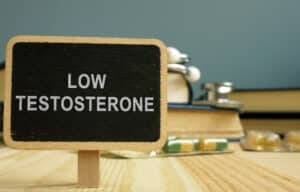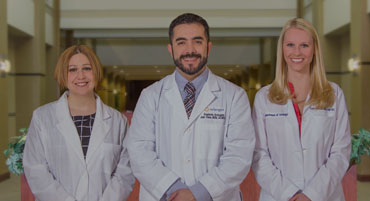Low Testosterone (Low T) Treatment in Chattanooga, TN

Testosterone plays a key role in men’s health, supporting everything from sex drive and sperm production to muscle growth and bone density.
As men age, testosterone levels naturally decline – often starting around age 30 – leading some to experience symptoms such as reduced libido, fatigue, or difficulty maintaining an erection. This condition, known as hypogonadism or testosterone deficiency, can impact daily life but is manageable with proper care.
Dr. Anand Shridharani offers personalized treatment for low testosterone. As a fellowship-trained urologist specializing in men’s reproductive health, he provides careful evaluation and evidence-based services to help restore balance and improve quality of life.
Click to Call Dr. Shrid Today to Learn More
Low T Symptoms
Common signs of low testosterone include:
- Low sex drive (aka low libido)
- Difficulty getting and maintaining erections
- Shrunken and softer testicles
- Loss of body and facial hair
- Increased fatigue
- Irritability, mood changes, or depression
- Reduced sexual sensation
- Insomnia or other sleep disturbances, including sleep apnea
- Increased body fat
- Reduced muscle mass
Causes of Low T
Low T can be caused by chronic medical conditions, including:
- Diabetes
- Infections
- Obesity
- Liver and kidney disease
Other contributing factors include:
- Undescended testicles
- Pituitary disorders/tumors
- Physical damage to the testicles via trauma, surgery, or infection
- Mumps
- Cancer treatment
- HIV/AIDS
- Some medications (such as opioids, statins, antidepressants, beta blockers)
Diagnosis of Low T
To diagnose low T, Dr. Shridharani will take a medical history and perform an exam. He will assess your symptoms with a questionnaire and evaluate the amount and distribution of your body hair.
You will have standard blood tests to determine your testosterone levels (total and free testosterone) and assess your pituitary hormones, estrogen levels, thyroid, and liver function.
Certain symptoms, such as those related to osteoporosis or sleep apnea, will need further investigation with scans and additional testing.
Click to Call Dr. Shrid Today to Learn More
Testosterone Replacement Therapy Treatment Options
Once your diagnosis is confirmed, there are various therapies to treat low T, including the following.
Topical Gels and Creams
Topical gels and creams usually last 24 hours and are most likely to mimic the normal rhythm of natural testosterone. Several brands have convenient ways to apply for the medication, and insurance often covers them. Keep in mind, though, that topicals have the risk of rash and transfer to your partner or children.
Testosterone Injections
Testosterone injections can be short-acting, lasting 4-7 days, or depot formulations, which last about 3 months and require 4-5 injections. Injection-related testosterone levels usually peak after 2-4 days and then drop.
Testosterone injections are generally safe when monitored by a qualified provider. They come with some considerations, though. If doses are spaced too far apart or levels rise too high, it may lead to fluctuations that affect mood, energy, or sexual function. In some cases, higher levels can increase red blood cell counts, which should be monitored to reduce the risk of complications.
Testosterone Pellets
Small testosterone pellets can be implanted under the skin. They slowly release testosterone over 3-6 months. Testosterone levels do not peak like they do with injections, but instead reach a steady plateau. Side effects may include bruising or hematoma at the implantation site and temporary leg swelling.
Testosterone Supplements
Testosterone supplementation can result in impairment of sperm production and should not be used when future fertility is desired. Alternative drugs are available for men in their reproductive years, including aromatase inhibitors, hCG, and SERMs (selective estrogen receptor modulators). These therapies improve testosterone levels and enhance sperm formation.
Benefits of Testosterone Replacement Therapy
Testosterone replacement therapy provides many benefits, including:
- Improved sex drive
- Improved erectile function, erections, ejaculations, and sexual satisfaction
- Improved bone mineral density
- Increased lean body mass
- Improved energy and mood
- Improved glycemic control in men with diabetes
- Decreased fat mass
- Improved triglycerides and total cholesterol
Once you begin testosterone replacement therapy, Dr. Shrid will regularly monitor your response. If you fail to experience symptomatic relief after 3-6 months, it may be discontinued. If you experience improvement in symptoms, you will be monitored to ensure continued benefits. Your blood counts, liver function tests, prostate-specific antigen (PSA), and testosterone levels will be checked at least at 6-month intervals.
Contraindications to Testosterone Replacement Therapy
Men with untreated sleep apnea and untreated severe congestive heart failure should not undergo testosterone replacement therapy.
Studies show conflicting information on whether testosterone replacement therapy leads to an increased risk of heart attacks in this population. Nevertheless, men with preexisting heart disease should proceed with caution.
Potential Side Effects of Testosterone Replacement Therapy
As with any drug, there are some side effects from testosterone replacement therapy, including acne, oily skin, fluid retention, and breast enlargement. Talk to your doctor to find out if testosterone replacement therapy is right for you. A serious risk of blood clots, heart attacks, and strokes can occur. However, the side effects, besides blood clots, currently lack definitive evidence.
Why Choose Dr. Shridharani?
Patients seeking low testosterone treatment in Chattanooga, TN, can trust Dr. Anand Shridharani for experienced, specialized care. A board-certified, fellowship-trained urologist, he focuses on male reproductive and prosthetic urology, offering personalized support rooted in the latest research and technology.
Dr. Shrid has advanced training in andrology and memberships in leading urological societies. He brings deep clinical knowledge to every case, prioritizing patient education and encouraging shared decision-making to achieve the best outcomes. His ongoing clinical research and contributions to international guidelines also underscore his commitment to men’s health.
Low T FAQs
How Can I Improve My Testosterone Levels Quickly and Naturally?
To quickly and naturally improve your testosterone levels, try a few of the following lifestyle changes:
- Implement a healthy diet and cut out processed, fatty foods.
- Stick to a regular exercise routine to help maintain a stable body weight.
- Try to get at least seven to eight hours of sleep a night. A consistent sleep schedule will help regulate the body.
- Avoid tobacco products and smoking.
- Avoid opioid pain medications.
- Avoid alcohol.
- Eliminate major stressors.
What Happens If Low Testosterone Is Not Treated?
Leaving your low testosterone untreated can be dangerous and may lead to serious health conditions. If testosterone levels drop too low, men are at a higher risk of developing cardiac problems. For men over the age of 50, this may lead to a heart attack.
Untreated low testosterone levels may also reduce bone density and muscle mass, making daily tasks more difficult. In addition, low testosterone may exacerbate problems in your sex life that can lead to relationship issues.
What Is the Natural Testosterone Level in Men?
Testosterone levels for males aged 19 and older are typically between 300 and 1,000 ng/dL. After reaching age 30, these levels are expected to decline by nearly 1%. Committing to healthy lifestyle habits or seeking treatment will help patients avoid the problems that can result from low testosterone.
What Are the Risks of Using Over-The-Counter Testosterone Boosters?
Over-the-counter testosterone boosters are not regulated like prescription medications. This means their ingredients, potency, and safety are not guaranteed.
Many products contain herbal blends or unproven substances that interact with other medications or cause side effects such as liver damage, acne, aggression, or hormonal imbalances. Some may even contain hidden steroids.
Using these products without medical supervision can also mask underlying health problems. Men considering testosterone support should consult a healthcare provider to receive proper testing and guidance, rather than relying on unverified supplements that could pose more risks than benefits.
How Long Does It Take To Notice Changes After Starting Treatment for Low Testosterone?
The timeline for noticing changes after beginning treatment for low testosterone can vary by individual and method of treatment.
Some men may feel increased energy, improved mood, or enhanced libido within a few weeks. However, physical changes like increased muscle mass, improved strength, or body fat reduction may take several months. Cognitive and emotional improvements can also take time to stabilize.
Full benefits typically develop over three to six months. Regular follow-up appointments and lab tests are important for monitoring and treatment adjustments.
Can Low Testosterone Be Mistaken for Other Health Conditions?
Yes, low testosterone symptoms often overlap with other conditions, making it easy to misinterpret. For example, fatigue, mood changes, weight gain, reduced libido, and trouble concentrating can also be linked to depression, thyroid issues, sleep apnea, or even chronic stress.
Without proper hormone testing, low testosterone can be overlooked or confused with unrelated medical concerns. That’s why a thorough evaluation – including blood tests and a review of symptoms and medical history – is critical before diagnosing.
Is Low Testosterone Connected to Infertility or Sperm Production Issues?

At the same time, some testosterone replacement therapies can actually reduce sperm production by suppressing natural hormone signals. Men concerned about fertility should discuss their reproductive goals with a specialist before starting treatment. Alternative options may be better suited for preserving or improving sperm health.
Can Low Testosterone Affect Focus or Memory?
Low testosterone may contribute to cognitive issues such as trouble focusing, forgetfulness, or mental fog.
Testosterone has a role in brain function, and declining levels have been associated with reduced concentration and slower mental processing in some men. These symptoms are sometimes mistaken for stress, aging, or lack of sleep.
Addressing low testosterone through lifestyle changes or medical treatment may help improve mental clarity. However, cognitive symptoms should also be evaluated in the broader context of overall health, as they can stem from multiple factors beyond hormone levels.
Schedule a Low T Consultation Today
Do you suspect you’re dealing with low testosterone? Dr. Shridharani can help. He has extensive experience in male reproductive endocrinology and hormone replacement and provides individualized, patient-centered care.
If you are in the Chattanooga or Knoxville, TN, Northern Georgia, or Huntsville, AL areas, contact us at (423) 778-4MEN (4636) to learn more about testosterone replacement therapy.




